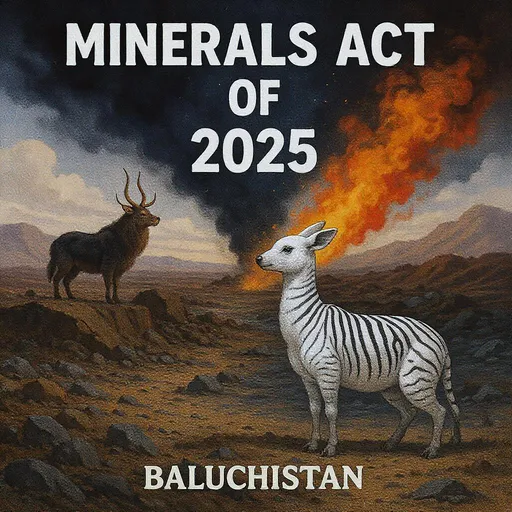THE MINERAL TENSION IN BALUCHISTAN
The issue of minerals is considered a major driver of problems in Balochistan. As the largest province in Pakistan, Balochistan holds significant economic potential. Its neglect by Great Britain has cost the Anglo-Indian rule considerably, a point vividly elaborated by William Dalrymple in his book, "The Battle for Afghanistan." The deep-rooted crises in Balochistan today are also a result of neglect by the Pakistani government. If it had not been overlooked and had been provided with quality education, adequate budget allocations, and an efficient governance structure, Balochistan could have become an economic powerhouse both within the country and internationally. The recent proposals for deals and delegations are clear examples of Balochistan's economic significance.
The new Minerals Act of 2025 has once again ignited public tensions and mass unrest. The primary issue with this act is that it was passed swiftly without any discussion or opposition. This political gridlock continues because similar acts have been enacted in the past concerning Balochistan's mineral issues, yet they have not been implemented. Assembly members claimed they were informed the act pertained to budget allocation, only to later discover it was actually about mineral deals. Such situations often give rise to conspiracy theories. A significant concern regarding this act is that it was influenced by a U.S. delegation led by Eric Mayer, who demanded a share in the minerals and emphasized the recent discovery of reserves at Reko Diq. Given the public's distrust of exploitative practices associated with the U.S., this delegation precipitated the passage of the Balochistan Mines and Minerals Act of 2025, leading to serious political unrest and public resentment in the region.
The history behind the autonomy of Balochistan and its control over minerals is interrelated with the Regulation of Mines and Oilfields and Mineral Development Act of 1948 and the 18th Amendment in 2010, which clearly grants Balochistan full control over its natural reserves. The purpose of passing these acts was to enhance international competition, increase free trade between provinces, and attract both domestic and foreign investment. Central to these acts, and the reason for the current turmoil, is granting autonomy to provinces over their natural resources.
However, when the Balochistan Mines and Minerals Act was passed in 2025, it raised concerns among policymakers because it violated the terms and conditions of previously enacted legislation. The 18th Amendment clearly assigns provinces full autonomy, while the 2025 Act grants the federal government full control over natural resources. The same contradiction appears in the 1947 Act, which, following the 7th Amendment, contradicts the 2025 Act by centralizing control over natural deposits. This Act of 2025 fundamentally violates the rights granted to Balochistan as well as Khyber Pakhtunkhwa.
As a student of History and Current Crises and a responsible citizen, I believe in being solution-oriented. Recently, Rafiullah Kakar mentioned in a podcast that a peace settlement is the first step to resolving Balochistan's problems. Other important policy solutions include:
"Public Share":
The terms of the Regulation of Mines and Oilfields and Mineral Development Act of 1948 and the 18th Amendment should be incorporated while designing remedies for the problems of Balochistan. This will help alleviate public resentment.
"Efficient Governance":
Efficient governance is crucial for Balochistan to enjoy its full rights. The implementation of all policies and acts is essential in this regard.
Saying "No to Corruption":
Corruption significantly contributes to the wastage of budget resources. The chieftain system is a main pillar of this issue, as it prevents budgets from reaching their intended destinations. Therefore, corruption must be strictly prohibited, with stringent regulations established.
In conclusion, while the recent U.S. regulations may present new opportunities and open doors to greater economic power, exploiting local populations for foreign interests is wholly condemnable. Let us unite, implement the proposed solutions, and foster a sense of patriotism without public resentment. We should adopt a clear and strategic approach focused on an integral peace settlement. Let us stand with our Baloch and Pushtun brothers in Balochistan until they obtain their rights—death in this struggle would indeed be a blessing. Hand in hand, like true brothers, we can certainly emerge as the leaders of the future, with the help of Allah Almighty.




I think he is the greatest child researcher on Baluchistan.
ReplyDelete